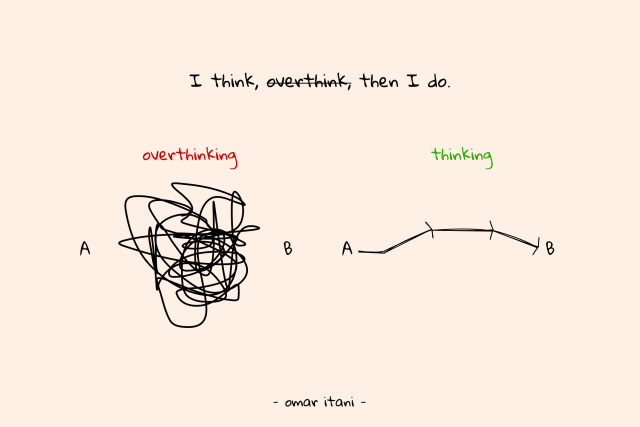Overthinking

According to Smith & Alloy (2009), overthinking is the condition where people think excessively about life, choices, and experiences. This condition often leads to analysis paralysis, making decision-making very difficult.
Overthinking can occur when the mind works too hard, constantly considering various possibilities, potential outcomes, and worst-case scenarios. Overthinking can be caused by perfectionism, fear of failure, negative past experiences, and low self-esteem. It can also be dangerous as it may cause those to continually dwell on the past, worry excessively about the future, and often second-guess themselves. They may spend a lot of time and energy analyzing every detail of a situation, leading to mental exhaustion and hindering their ability to make clear decisions.

Overthinking can happen to anyone and is dangerous because it can impact a person’s mental health and overall well-being. Moreover, the ideas and analyses resulting from overthinking, which should be based on excessive worry, turn into overblown analysis.
It gets worse when those ideas and analyses are then spread on social media, widely read by many, because social media is perceived as a trusted channel for disseminating ideas and analyses. Consequently, overthinking spreads quickly like a virus.
The overthinking virus has the potential to spread after the election period. It can affect not only every candidate’s campaign team but also supporters who become impromptu observers and personal advocates.
Overthinking and Corporate Strategy
If overthinking occurs at an individual and societal level, could it also happen on a corporate scale? Should overthinking be induced when creating corporate strategies?
There is a lot of potential for overthinking in formulating corporate strategies. When starting an analysis, typically, a company’s internal conditions are evaluated and assessed before moving on to the external conditions. This is the most popular analysis, known as SWOT analysis.
Internal conditions are certainly rational analyses because the company best understands its strengths and weaknesses. The potential for overthinking increases significantly during the external analysis, which is related to opportunities and, primarily, threats.
External factors are uncontrollable, so many assumptions arise, and various scenarios emerge. Therefore, overthinking in corporate strategy refers to excessive analysis and contemplation of various possibilities and scenarios for a company’s direction and goals. This often leads to indecisiveness and delayed actions, as overthinking creates many options and potential outcomes.
To avoid overthinking in corporate strategy, it is important to establish a clear decision-making process and set realistic goals and objectives. Seeking input from diverse stakeholder groups and utilizing data and market research can help provide a more objective perspective. Focusing on those that are realistic and objective.
There are several steps or points to avoid overthinking in companies, especially in strategy formulation.
First, conduct careful analysis without excessive assumptions. Complete and accurate data and the ability to process it (data mining) provide better certainty for more accurate predictions. Second, trust the competence and experience of the leadership team without second-guessing every decision. Leadership plays a crucial role. However, it is dangerous if the leadership team is affected by overthinking, so ideally, the leadership team should be free from the overthinking virus.
Overall, finding a balance between careful analysis and decisive action is key to avoiding overthinking in corporate strategy. By focusing on the most important priorities and aligning them with the company’s overall vision, leaders can move forward with confidence and clarity.
Striving for perfection is natural, but it is also important to realize that no decision or strategy is perfect, and adjustments should always be made periodically. Therefore, a company’s ability to adapt to dynamic external and internal environments is crucial. Dynamic capabilities, or the ability to integrate, build, and reconfigure resources, are vital for learning competitive advantages in unstable conditions (Eisenhardt and Martin, 2000).
Dynamic capabilities enable companies to maintain their new competencies to meet changing market needs and include the ability to integrate, learn, and reconfigure internal and external organizational skills and resources (Teece et al., 1997).
Moreover, dynamic capabilities allow, first, to sense and shape opportunities. Second, to seize opportunities. And third, to maintain competitiveness through enhancing, combining, protecting, and reconfiguring tangible and intangible assets (Teece, 2007).

It is important to realize that not all thinking is bad. It is natural and necessary to consider various options and consequences in decision-making. Thinking is an essential part of human existence and companies. It allows people and companies to understand the world and dynamic environment, plan for the future, and reflect on the past.
However, when thinking patterns become excessive, repetitive, and negatively focused, it can lead to overthinking and too much contemplation. This mental habit represents the dark side of our minds.
By SRI BRAMANTORO ABDINAGORO
Sri Bramantoro Abdinagoro is a professor in BINUS Business School Doctoral Program and a member of Indonesia Strategic Management Society (ISMS)
Source: https://www.kompas.id/baca/opini/2024/02/15/berpikir-berlebih and ISMS

